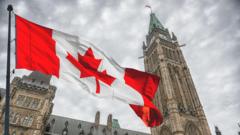As a hereditary peer, Lord Cromwell faces the impending loss of his seat in the House of Lords due to governmental reforms aimed at modernizing the parliamentary system. His insights reveal both personal reflections on noble lineage and broader implications for democratic representation.
The End of an Era: The Legacy of Hereditary Peers in Britain

The End of an Era: The Legacy of Hereditary Peers in Britain
Lord Cromwell reflects on a transformative period as hereditary peers prepare to lose their seats in Parliament as the U.K. government pushes for reform.
Godfrey John Bewicke-Copley, the 7th Baron Cromwell, stands at a crossroads in British political history. With the U.K. government set to implement reforms in 2025 that will remove hereditary peers from Parliament, Lord Cromwell and 87 others find themselves contemplating their legacy and the nature of their service.
Tracing his aristocratic lineage back to 1375, and with ancestors who contributed to notable historical events like the Battle of Agincourt, Lord Cromwell has served in the House of Lords for over a decade. Despite his noble birthright, he emphasizes that his contributions are not defined by the privileges of his title. “We are not the port-swilling, fox-hunting hoorays on vast Downton Abbey-esque estates of popular imagination,” he stated. Instead, he reflects a more grounded reality—hardworking individuals contributing to vital legislative discourse.
Beyond his title, Lord Cromwell has pursued a career in private banking, specifically advising businesses operating in Russia, and manages the family farm in Leicestershire. An engaged member of the House of Lords, he often brings his voice to urgent debates, including those surrounding international conflicts like Ukraine and domestic issues, such as water quality.
However, the forthcoming law that eradicates hereditary peers will not spare individuals like Lord Cromwell from removal, as the Labour government aims to dismantle what it perceives as an outdated and undemocratic component of the legislative process. The proposed changes signal a significant shift in the political landscape of Britain, with supporters claiming they will address the bloated and archaic nature of the House of Lords.
While acknowledging the potential loss of his seat with a blend of regret and acceptance, Lord Cromwell remains witty and reflective, indicating that such changes, while momentous, may ultimately serve to rejuvenate the House of Lords and align it closer to democratic values. As hereditary rules begin to fade from the parliamentary system, voices like Lord Cromwell's will remain an essential part of the dialogue about the future of governance in Britain.






















